- Back to Home »
- Pact slows Iran's ability to build a nuclear weapon
- Iran retains the right to enrich uranium but not over nuclear fuel level
- Israel does not recognize the deal and reserves the right to act on its own, Netanyahu says
- The deal includes substantial limitations to prevent the creation of nuclear weapons, Obama says
- The deal follows marathon talks that stretched into early Sunday morning
Geneva, Switzerland (CNN) -- The diplomatic gridlock between Iran and the West seemed immovable for decades. But on Sunday diplomats made history, when Iran and six world powers came together on an agreement over Iran's nuclear program.
The deal dials back Iran's ability to work towards a nuclear weapon and at the same time loosens the choke hold of international sanctions on Iran's economy.
The two sides now have six months to find out how historic the breakthrough is. That's how long the preliminary agreement hammered out in Geneva, Switzerland, by Iran and the P5+1 -- the five members of the U.N. Security Council and Germany -- lasts.
The foreign policy chiefs from the nations making up the group had traveled to Geneva from the United States, Britain, France, Russia, China and Germany on Saturday to pound out the last key points of deal.
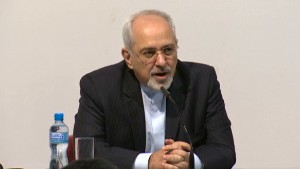 Iran happy with 'first step'
Iran happy with 'first step' 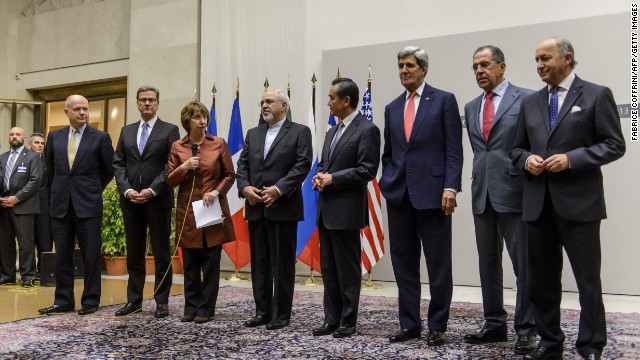 Chief negotiator Catherine Ashton and Iran's foreign minister announce agreement on Iran's nuclear program early on Sunday, November 24 in Geneva. From left to right: British Foreign Secretary William Hague, German Foreign Minister Guido Westerwelle, EU foreign policy chief Catherine Ashton, Iranian Foreign Minister Mohammad Javad Zarif, Chinese Foreign Minister Wang Yi, U.S. Secretary of State John Kerry, Russian Foreign Minister Sergei Lavrov and French Foreign Minister Laurent Fabius.
Chief negotiator Catherine Ashton and Iran's foreign minister announce agreement on Iran's nuclear program early on Sunday, November 24 in Geneva. From left to right: British Foreign Secretary William Hague, German Foreign Minister Guido Westerwelle, EU foreign policy chief Catherine Ashton, Iranian Foreign Minister Mohammad Javad Zarif, Chinese Foreign Minister Wang Yi, U.S. Secretary of State John Kerry, Russian Foreign Minister Sergei Lavrov and French Foreign Minister Laurent Fabius. 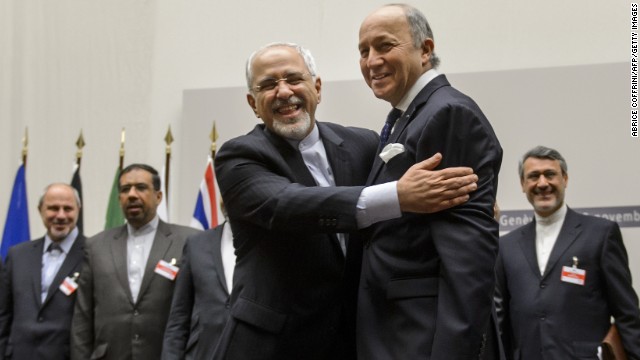 Iranian Foreign Minister Mohammad Javad Zarif, left, and French Foreign Minister Laurent Fabius react after the announcement.
Iranian Foreign Minister Mohammad Javad Zarif, left, and French Foreign Minister Laurent Fabius react after the announcement. 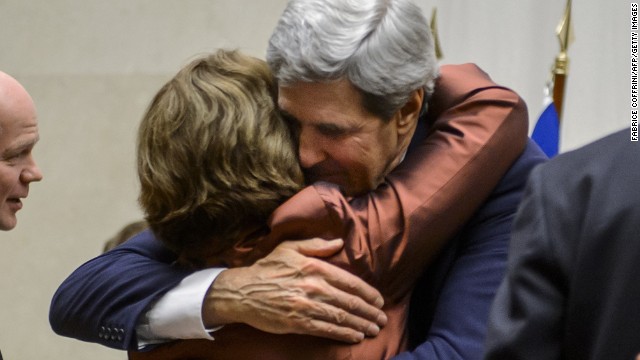 EU foreign policy chief Catherine Ashton and U.S. Secretary of State John Kerry embrace after the statement.
EU foreign policy chief Catherine Ashton and U.S. Secretary of State John Kerry embrace after the statement. 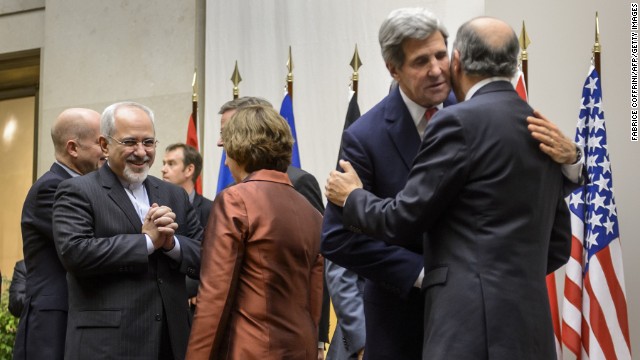 Iranian Foreign Minister Mohammad Javad Zarif talks with EU foreign policy chief Catherine Ashton as U.S. Secretary of State John Kerry embraces French Foreign Minister Laurent Fabius.
Iranian Foreign Minister Mohammad Javad Zarif talks with EU foreign policy chief Catherine Ashton as U.S. Secretary of State John Kerry embraces French Foreign Minister Laurent Fabius. 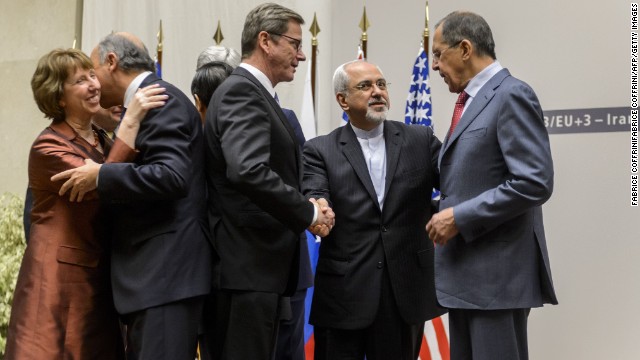 EU foreign policy chief Catherine Ashton and French Foreign Minister Laurent Fabius share a hug while German Foreign Minister Guido Westerwelle, Iranian Foreign Minister Mohammad Javad Zarif and Russian Foreign Minister Sergei Lavrov talk.
EU foreign policy chief Catherine Ashton and French Foreign Minister Laurent Fabius share a hug while German Foreign Minister Guido Westerwelle, Iranian Foreign Minister Mohammad Javad Zarif and Russian Foreign Minister Sergei Lavrov talk.  Photos: Iran nuclear deal reached
Photos: Iran nuclear deal reached 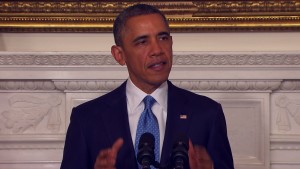 Obama reacts to Iran nuclear deal
Obama reacts to Iran nuclear deal 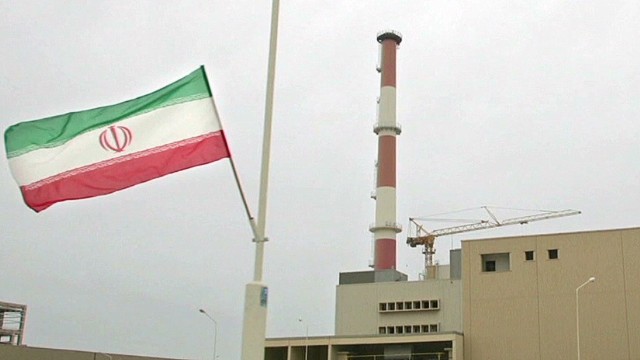 Iran deal 'important step forward'
Iran deal 'important step forward' Iran has stumbled from one economic crisis to the next under the sanctions, and unemployment currently runs over 24%.
The breathing room is intended to buy Iran and the negotiating powers time to arrive at a more comprehensive agreement. But it represents an opportunity, not a guarantee.
"It's a little too early to break open champagne bottles and put on the party hats on this one," said Middle East diplomatic expert Aaron David Miller. Its success hinges on whether or not it leads to a bigger agreement to "puts Iran's nuclear weapons program to rest."
That the diplomats came to any accord at all represents a momentous budge in a nearly 35-year-long deadlock marked by distrust, suspicion and open animosity between the United States and Iran, which broke off diplomatic relations after Iran's revolution in 1979.
It was the first such agreement in 10 years of negotiation attempts over Iran's nuclear program.
"What happened over the last several weeks is by any standard extraordinary," Miller said.
Success or setback?
Reactions to the breakthrough ran the gamut from joy in Tehran to dismay in Jerusalem.
In a televised speech, Iran's President Hassan Rouhani sold it as a win for his negotiators.
"We are pleased after 10 years that an agreement on this level has been reached," he said.
He played up that it allows Iran to enrich uranium to a level making it usable as nuclear fuel. During the six months of the agreement, major facilities in Iran will continue doing so, he said.
It also marks the beginning of the end of sanctions, he said. In the end, Iran's claim that it has never sought nuclear weapons will be vindicated, he said.
That notion will go down as "historical joke," he said.
Iran's Supreme Leader Ali Khamenei, traditionally very distrustful of Western powers, seemed pleased. This could be the basis of intelligent actions of the future, he said.
President Barack Obama took to live television to announce the deal as a success that includes "substantial limitations that will help prevent Iran from creating a nuclear weapon."
U.S. Secretary of State John Kerry has stressed that Iran will not be permitted to produce bomb-grade enriched uranium.
But decades of mistrust run deep.
Obama's Republican opponents in Washington scorned the deal, and key ally Israel frowned upon it.
Both say it will have the opposite effect, advancing Iran's alleged quest for a bomb.
"This agreement shows other rogue states that wish to go nuclear that you can obfuscate, cheat, and lie for a decade, and eventually the United States will tire and drop key demands," said freshman Sen. Marco Rubio of Florida.
Rubio has been touted as a presidential hopeful in the 2016 elections.
Israel: obligation to defend
Israeli President Benjamin Netanyahu adamantly distrusts Iran and decried the agreement as a "historic mistake" on Sunday.
For decades, he has listened to Iranian leaders threaten the Jewish state, even saying Israel should be wiped off the map.
During the negotiations in Geneva, Khamenei responded to passionate Israeli skepticism by saying Israeli officials "cannot be even called humans" and referred to Netanyahu as "the rabid dog of the region."
Now that sanctions are working, Netanyahu wants to see the thumbscrews tightened, not loosened, until Iran deconstructs much of its nuclear capabilities, which Tehran claims it will only use for peaceful purposes.
The agreement does not apply to Israel, he said Sunday. If need be, Israel will take matters into its own hands, he said.
"The regime in Iran is dedicated to destroying Israel, and Israel has the right and obligation to defend itself with its own forces against every threat. I want to make clear as the Prime minister of Israel, Israel will not let Iran develop a nuclear military capability."
Washington skeptics
In the weeks before the start of the negotiations, U.S. legislators appeared to be obliging Netanyahu, as they considered loading new sanctions on the Islamic Republic.
If this happens, Obama may have to veto them, Kerry said. New sanctions would torpedo the deal.
But Kerry said he will assure Congress the deal supports its goal of preventing Iran from developing a nuclear weapon.
The President has said that the agreement only involves some of the sanctions, leaving the toughest ones in place. The agreement is not about trusting Iran. It is about being able to verify the country's compliance, a Whitehouse official said.
If things go sour, all options are still on the table, Obama has said, including military strikes on Iran's nuclear facilities.
Obama understands how Israel in particular feels about Iran, a senior administration official said. "You can be sure that President Obama will speak to Prime Minister Netanyahu" on Sunday.
He may also have to have a conversation with the Kingdom of Saudi Arabia, Iran's neighbor across the Persian Gulf, which has lasting tensions with Tehran and has been at odds with Obama over much of his Middle East policy.
The government expressed displeasure Sunday with the preliminary deal.
"The Saudi government has been very concerned about these negotiations with Iran and unhappy at the prospect of a deal with Iran," a Saudi government official who is not authorized to speak to the media told CNN.
All about enrichment
The White House and Iranian Foreign Minister Mohammad Javad Zarif both insist that the agreement meets their expectations on issue of uranium enrichment.
Iran has consistently said it's enriching uranium and building nuclear reactors only for peaceful civilian energy needs. Nuclear power plants use uranium that is enriched to 5%. It's the fuel that the plants use to generate electricity.
The White House has said enrichment may not go above that.
Iran must also dilute to below 5% or convert to a form not suitable for further enrichment its entire stockpile of near-20% enriched uranium before the end of the initial phase of the deal.
It may also not bring certain centrifuges on line, the devices used to enrich uranium, that have not yet been turned on.
This is in line with the terms of the Treaty on the Non-Proliferation of Nuclear Weapons, which Iran has signed onto. It requires Tehran not to create nuclear weapons or enable other countries to obtain them.
Iran has also agreed to what Kerry described as "unprecedented international monitoring" of its nuclear program.
The Rouhani difference
This final round of negotiations in Geneva stretched on for four days but began months ago in secrecy, shortly after Rouhani replaced Mahmoud Ahmadinejad as Iran's President earlier this year.
Caustic jabs at the United States and bellicose threats toward Israel were a hallmark of Ahmadinejad's foreign policy rhetoric. He railed against economic sanctions and drove the advancement of nuclear technology.
Rouhani has struck up a more conciliatory tone and made the lifting sanctions against his country a priority.
U.S. and Iranian officials for months have been holding private, previously secret discussions to generate ideas for the wider nuclear negotiations, a senior Obama administration official confirmed Saturday.
The Americans briefed their P5+1 colleagues. It led to formal negotiations in Geneva.
Catherine Ashton, the European Union's foreign policy chief, led the working negotiations to their near conclusion Saturday night.
Then, to pound out difficult details, she called in the heavy lifters on Saturday: Kerry, his British counterpart William Hague, France's foreign minister Laurent Fabius, Chinese Foreign Minister Wang Yi and Russia's foreign policy chief, Sergey Lavrov.
Shortly after 3:00 a.m. local time Sunday, a Tweet from a European diplomat let on that there was a deal, and an hour later, an Iranian colleague followed suite.
Minutes later, Ashton made the official announcement.
A diplomatic mountain had been moved.
Jim Sciutto is in Geneva, and Ben Brumfield reported and wrote from Atlanta. CNN's David Simpson, Chelsea Carter, Neda Farshbaf, Tom Dunlavey, Alexander Fenton and Jim Acosta contributed to this report.







